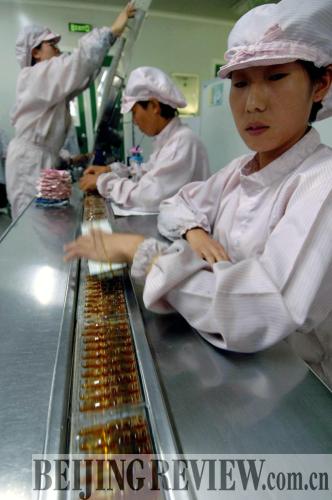|
 |
|
HIGH STANDARDS: Workers produce TCM injections at China Shineway Pharmaceutical Group, which is based in Hebei Province, in September 2006 (GONG ZHIHONG) |
Traditional Chinese medicine (TCM) practitioners began extracting and injecting the effective substances of herbs into muscles, acupuncture points and veins as a curative decades ago. But safety concerns arising from that practice have recently begun to surface.
The injections combine TCM herbs with modern technologies and the result, according to the State Food and Drug Administration (SFDA) statistics, is an industry that generates more than 20 billion yuan ($2.93 billion) in sales from around 400 million people who take TCM injections annually. TCM injections are used to treat a number of diseases of the blood and heart, among others.
Since 2008, however, a number of patients have died after taking injections of Ciwujia injection, prescribed to treat brain and heart diseases, and Shuanghuanglian injections for cold and fever. Other types of injections have also been blamed for causing injuries over the last several years and have come under scrutiny. Officials from Beijing TCM University said the concerns have caused some large hospitals to stop administering the injections.
However, compared with all the negative reports of the TCM injections, the statistics from SFDA show that TCM causes fewer adverse reactions than modern medicines. In 2007, among all the adverse reaction records, Western medicine accounted for 86.7 percent, TCM accounted for 11.9 percent, and in 2008, TCM accounted for 13.2 percent. TCM injections, as one part of the traditional regime, cause only a small proportion of the problems.
Dongzhimen Hospital, a Beijing TCM University affiliate, has offered TCM injections for many years. Officials say sales have risen yearly.
Wang Yaoxian, President of Dongzhimen Hospital, said there are 26 kinds of TCM injections in the hospital. Wang said the hospital sees about 40 adverse reactions every year, with most cases being minor. In 2007, the hospital gave 27,200 Qingkailing injections (ordered for stroke and liver diseases) to 1,300 patients and recorded one adverse reaction. In 2008, the hospital reported three negative reactions to 29,440 Qingkailing injections. Between 2007 and 2008, the hospital gave almost 19,000 Shenmai injections (prescribed to treat heart diseases), none of which caused adverse reactions.
Liu Qingquan, Vice President of Dongzhimen Hospital, has been part of the research concerning adverse reactions to TCM injections. Liu said that negative effects do not come from the injections, but the improper administration of the shots in the hospital.
"If you take the accidental death that happened in February 2009 as a result of a Shuanghuanglian injection in Qinghai Province as an example, the patient had a cold and the hospital initially administered several antibiotic injections before giving the Shuanghuanglian injection," said Liu. "The death was the result of an improper combination of chemical and TCM injections."
This is not the only instance of misusing TCM injections. In the first half of this year, a Henan Province patient died after getting a Qingkailing injection that was produced by China Shineway Pharmaceutical Group, which is based in Hebei Province and generated 800 million yuan ($117 million) in sales in 2008. After receiving the report, the Hebei Provincial Food and Drug Administration investigated the company but found nothing wrong with its production process.
"We finally found that the reason lay in the improper use of the medicine," said Li Xun, a Shineway manager. The patient was suffering from a cold and fever, Li said, and the hospital injected him with more than 10 Western pharmaceuticals and Qingkailing. Officials concluded that the combination of all the injections caused the patient's death.
After each of the accidental deaths, governments shut down suspect TCM manufacturers. The ensuing investigation can drag on for a while as investigators figure out where the responsibility falls.
| 